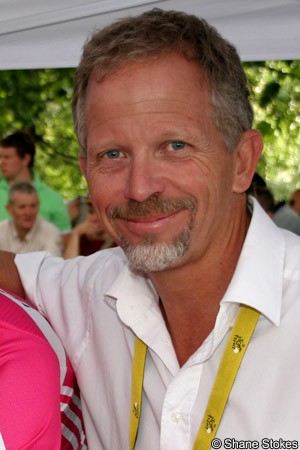Decision comes after evaluation of one-year test period
 USA Cycling (USAC), the body governing cycling races in the United States, decided to lift the radio ban for National Racing Calendar (NRC) races. The ban was imposed last year, following international efforts to do the same. The year-end review, with input from US teams, riders, organizers, officials and other stakeholders, USAC decided to do away with the ban that also includes the USA Cycling professional and elite road national championship events.
USA Cycling (USAC), the body governing cycling races in the United States, decided to lift the radio ban for National Racing Calendar (NRC) races. The ban was imposed last year, following international efforts to do the same. The year-end review, with input from US teams, riders, organizers, officials and other stakeholders, USAC decided to do away with the ban that also includes the USA Cycling professional and elite road national championship events.
USA Cycling CEO Steve Johnson explains that the decision came after careful investigation. “As we approached the 12-month anniversary of the radio ban in domestic races, we listened to input from the various affected stakeholders, including officials, race directors, team directors and riders.” This is something that the International Cycling (UCI) has been criticized for – the lack of involving the affected parties. The UCI has extended its radio ban to all races, following some trials last year.
Johnson says that several key factors were under investigation. “In the process, we considered all of the categories of the racing environment that are impacted by radios, including rider and spectator safety, caravan and peloton management and team/rider communication. Frankly, radios won on every count.”
The European peloton is mostly in favor of using radios, citing safety concerns. That is the same feeling in the US. “The vast majority of athletes, teams and event managers agree that safety cannot be compromised, and that progressive sports use more communications technology, not less,” says Bob Stapleton (pictured), owner of the HTC-Highroad professional cycling team and USA Cycling board of directors USPRO representative. “The goal is to make cycling both safe and exciting and to ultimately bring the audience further into the action.”
Besides the safety aspect, some also think that radios make races more exciting rather than more boring, the argument that the radio critics have. “The decision was made because we believe race radios bring a unique level of strategy that is good for cycling, provide for innovation opportunities with our broadcast partners, and gives everyone in the peloton an additional safety measure,” says USA Cycling board of directors President and USPRO representative Bill Peterson. “We have spent considerable time discussing this issue with many experienced racers, team managers, and race organizers; we have yet to find anyone make a convincing case to eliminate race radios. Therefore, we are allowing radios within the races we control, and I suspect many countries around the world will follow our lead.”
Current professionals, such as USPRO board of trustees athlete representative Nick Reistad, have the same opinion. “We’ve based our decision on several factors, including the nature of racing in the United States and the inherent safety and liability issues that we feel are extremely important.” Reistad uses his own racing as an example. “In my own cycling career, I can detail examples where race radios were critical in relaying information regarding safety hazards, including emergency vehicles traveling backwards on the course, which could have put my life, and the lives of those racing with me, in imminent danger.”
The first 2011 NRC event, the Redlands Bicycle Classic, will take place March 31 – April 3.